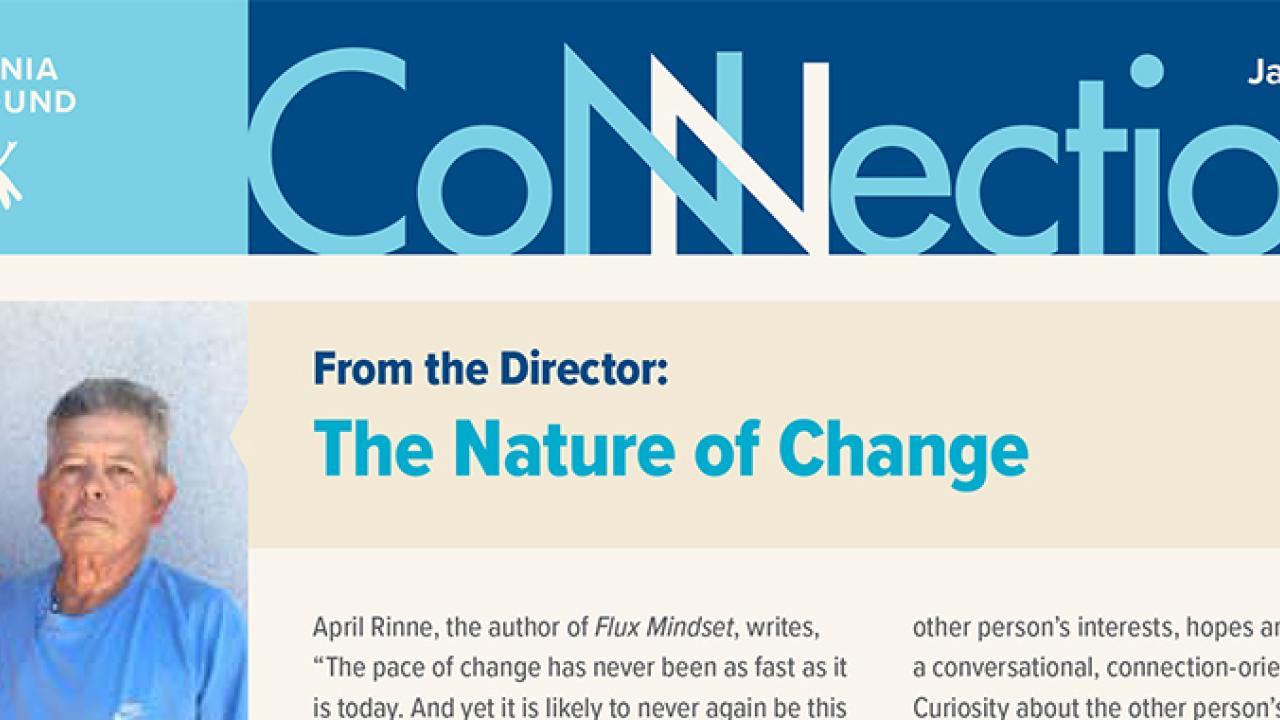
California Wraparound Connections - January 2022
From the Director: The Nature of Change

By Nancy Hafer, M.S., Director, Resource Center for Family-Focused Practice
April Rinne, the author of Flux Mindset, writes, “The pace of change has never been as fast as it is today. And yet it is likely to never again be this slow. And if you pause for a minute and just let that sink in, it’s kind of exciting and it’s a little bit terrifying.” I’ll add that it’s a little exhausting and it’s not hard to see the effects of so much change on our own faces as well as those with whom we work. Additionally, the amount of uncertainty in this past 20+ months has been intense and taking its own toll in many areas. Burnout, exhaustion, transition, hope… each influence how we balance needs of youth, family and provider in the short- and long-term. Together we help each other hold the tension of paradox: both/and. The intense pace of change is something we can learn to BOTH embrace and appreciate, AND we can acknowledge that the impacts of uncertainty are real.
Rinne suggests we cultivate a flux mindset—a mindset where we understand that change is an ally that we can learn to harness. The world of flux has arrived. Resisting the flux might look a lot like floundering in the water. Instead, how can we “surf the waves?” This newsletter provides information on how we can support each other in becoming flux wave surfers. Supportive practices can look like empathy, compassion, love and care, both for ourselves and for each other. Strengths-based, hopeful approaches such as motivational interviewing offer us options for interacting during times of change, teaching us to “roll with resistance” and be less combative (with ourselves and others).
Having tried-and-true methods of communication can provide guidance when so many other aspects are up in the air. MI is one approach to intentional communication that provides the interviewer with strategies to learn about the other person’s interests, hopes and concerns in a conversational, connection-oriented manner. Curiosity about the other person’s feelings, hopes, experiences, and ideas for how to make small changes to reach a larger goal. Change talk is a pivotal part – when the status quo is not working and the person can envision ways life would be better with some manageable changes. Once these are shared out loud, the listener can practice reflecting back the information to highlight the positive potential changes that can lead to larger goals. This intentional approach to communication can both identify desired changes as well as how confident the person is about being able to make changes on their own. Once these are known, specific supports can be obtained and used to support the overall change desired.
Positive change is happening at the Resource Center! We have recently welcomed four wonderful and experienced new team members who I am so pleased and excited to introduce to you (page 11). We are thrilled to increase our capacity and services! We are in the process of getting many of our courses approved for Board of Behavioral Sciences (BBS) Continuing Education hours. We have successfully completed our Pilot version of the Foundational Wraparound course—and are excited to start offering this course on a regular basis beginning in January! (See this page for scheduled offerings)
Colleagues and friends, we have seen that change fatigue is real, and that we can learn to cope and adapt. As we enter a new year, let’s learn together how to be flux surfers by embracing change and finding the beauty in it.
Read the other articles in this issue on the blog or download this issue of the newsletter as a PDF.
